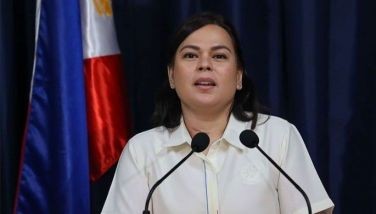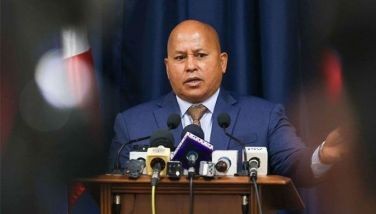‘Selective’ absentee voting mulled
April 14, 2003 | 12:00am
The Commission on Elections (Comelec) is contemplating a "selective application" of the absentee voting law since the government has yet to provide sufficient funds to allow for a full implementation of the May 2004 elections overseas.
Comelec Chairman Benjamin Abalos told The STAR that a majority of the poll body’s officials "somehow" share the same stance on the selective application of Republic Act 9189.
Congress allocated only P300 million in 2003 for Comelec to prepare for the elections, but Abalos said they need P1 billion — P800 million at the least — to conduct elections overseas.
The fund shall be used to support regional training of staff, purchase of equipment, and printing of forms and other election paraphernalia, among many others.
President Arroyo, in response to Abalos’ request for more money, said that additional funds needed to implement the absentee voting law will be provided in the 2004 budget.
Department of Foreign Affairs (DFA) officials said they will need a budget of P650 million to carry out its role in preparing for the conduct of elections overseas, but the government only allocated P100 million for 2003.
The DFA asserted that it needs at least P300 million to purchase equipment and facilitate passport verification during the voters’ registration, which is set to run from May to August this year.
"We have discussed this option of selective application of the absentee voting law in the en banc session (last Friday)… somehow four of us — Commissioners Mehol Sadain, Florentino Tuason, Resurreccion Borra, and myself — (agree that) this is our position given the budget of P300 million to implement it," Abalos said.
He added that Comelec has designated Tuason to communicate this position to Congress.
The selective application of the law will cover Filipinos in the United Kingdom, Japan and Canada where voting by mail is possible; and in countries with a large concentration of Filipino overseas workers such as Singapore, Los Angeles, and New York, where voting can be done in person, according to Abalos.
He noted that Comelec deliberately did not include Hong Kong and Taiwan due to the prevalence of Severe Acute Respiratory Syndrome (SARS) in these areas, and the Middle East due to the war in Iraq.
Sen. Renato Cayetano, however, said in a statement that senators expect that Comelec will submit these three countries for approval by the congressional oversight committee on the absentee voting law.
Early this month, Comelec approved the implementing rules and regulations of the absentee voting law but said it may not be able to implement it in next year’s elections due to the meager budget.
Tuason, who heads the Comelec committee on absentee voting, said that the schedule for the registration of Filipino overseas workers from May 5 to Aug. 4 this year will have to be called off due to the lack of funds.
He added that overseas registration will have to be postponed until Congress provides the budget to enable them to proceed.
Abalos has appealed for the amendment of the General Appropriations Act of 2003, which is to be signed by the President on April 23, to accommodate the budget required by the Comelec and DFA to implement the absentee voting law.
"I hope our lawmakers will be able to insert additional funds for the absentee voting before the President signs the (budget) for 2003. Otherwise, I don’t think it will still be possible for the government to make a supplemental budget for it," he said.
Cayetano, for his part, said that voting by mail shall be allowed in three countries with developed and secure postal systems. These countries should also have a system for ID verification that would preclude multiple or proxy voting, and with adequate provisions for receiving and securing mailed ballots in Philippine foreign service offices.
After next year’s elections, Cayetano said, voting by mail may be authorized in more countries, subject to review and approval by the bicameral oversight panel.
In voting by mail, the absentee voter shall send the accomplished ballot, enclosed in a specially marked envelope, to the Philippine embassy, consulate or foreign service office in the country where he or she resides.
The ballot shall be counted only if it is enclosed in that envelope, which will be sent to the voter along with the ballot.
The voter may cast the ballot anytime upon receiving it, provided it is received by the foreign service office before the close of voting hours on election day.
Comelec Chairman Benjamin Abalos told The STAR that a majority of the poll body’s officials "somehow" share the same stance on the selective application of Republic Act 9189.
Congress allocated only P300 million in 2003 for Comelec to prepare for the elections, but Abalos said they need P1 billion — P800 million at the least — to conduct elections overseas.
The fund shall be used to support regional training of staff, purchase of equipment, and printing of forms and other election paraphernalia, among many others.
President Arroyo, in response to Abalos’ request for more money, said that additional funds needed to implement the absentee voting law will be provided in the 2004 budget.
Department of Foreign Affairs (DFA) officials said they will need a budget of P650 million to carry out its role in preparing for the conduct of elections overseas, but the government only allocated P100 million for 2003.
The DFA asserted that it needs at least P300 million to purchase equipment and facilitate passport verification during the voters’ registration, which is set to run from May to August this year.
"We have discussed this option of selective application of the absentee voting law in the en banc session (last Friday)… somehow four of us — Commissioners Mehol Sadain, Florentino Tuason, Resurreccion Borra, and myself — (agree that) this is our position given the budget of P300 million to implement it," Abalos said.
He added that Comelec has designated Tuason to communicate this position to Congress.
The selective application of the law will cover Filipinos in the United Kingdom, Japan and Canada where voting by mail is possible; and in countries with a large concentration of Filipino overseas workers such as Singapore, Los Angeles, and New York, where voting can be done in person, according to Abalos.
He noted that Comelec deliberately did not include Hong Kong and Taiwan due to the prevalence of Severe Acute Respiratory Syndrome (SARS) in these areas, and the Middle East due to the war in Iraq.
Sen. Renato Cayetano, however, said in a statement that senators expect that Comelec will submit these three countries for approval by the congressional oversight committee on the absentee voting law.
Early this month, Comelec approved the implementing rules and regulations of the absentee voting law but said it may not be able to implement it in next year’s elections due to the meager budget.
Tuason, who heads the Comelec committee on absentee voting, said that the schedule for the registration of Filipino overseas workers from May 5 to Aug. 4 this year will have to be called off due to the lack of funds.
He added that overseas registration will have to be postponed until Congress provides the budget to enable them to proceed.
Abalos has appealed for the amendment of the General Appropriations Act of 2003, which is to be signed by the President on April 23, to accommodate the budget required by the Comelec and DFA to implement the absentee voting law.
"I hope our lawmakers will be able to insert additional funds for the absentee voting before the President signs the (budget) for 2003. Otherwise, I don’t think it will still be possible for the government to make a supplemental budget for it," he said.
Cayetano, for his part, said that voting by mail shall be allowed in three countries with developed and secure postal systems. These countries should also have a system for ID verification that would preclude multiple or proxy voting, and with adequate provisions for receiving and securing mailed ballots in Philippine foreign service offices.
After next year’s elections, Cayetano said, voting by mail may be authorized in more countries, subject to review and approval by the bicameral oversight panel.
In voting by mail, the absentee voter shall send the accomplished ballot, enclosed in a specially marked envelope, to the Philippine embassy, consulate or foreign service office in the country where he or she resides.
The ballot shall be counted only if it is enclosed in that envelope, which will be sent to the voter along with the ballot.
The voter may cast the ballot anytime upon receiving it, provided it is received by the foreign service office before the close of voting hours on election day.
BrandSpace Articles
<
>
- Latest
- Trending
Trending
Latest
Trending
Latest
Recommended





























